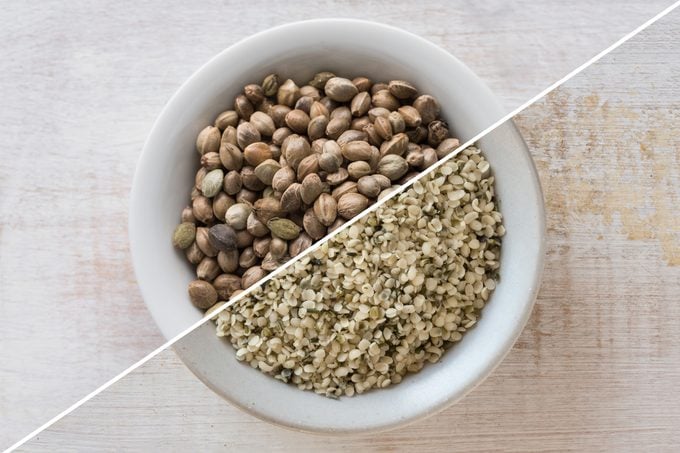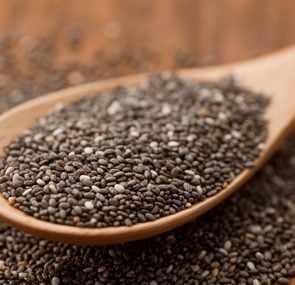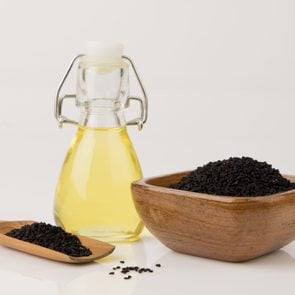Hemp Hearts vs. Hemp Seeds: What’s the Difference?
Updated: Jun. 28, 2021
Hemp is a good source of protein. Here's what you need to know about the subtle nutritional differences between hemp hearts vs. hemp seeds.
Our editors and experts handpick every product we feature. We may earn a commission from your purchases.
What is hemp?
No, it’s not your imagination: Hemp is having a moment. This plant, which is a relative of the marijuana plant, can be used in so many ways.
It’s leaves and stems contain CBD (cannabidiol), which has been showing up in products ranging from recovery creams, CBD oils, supplements, beverages, tinctures, edibles, and even shampoo. Hemp can also be used to make clothing, textiles, carpeting, and rope, and it can be found in foods like hemp milk, hemp hearts, hemp seeds, and hemp-based protein powder.
In some cities, you can even find it on restaurant menus. That’s because hemp is undeniably nutritious.
But hemp can also be a bit confusing—how is it different from marijuana? And what’s the difference between all these hemp-related foods, like hemp seeds and hemp hearts? Keep reading for the answer.

Hemp hearts versus hemp seeds
Hemp comes from the hemp plant, Cannabis sativa, which is a variety similar to the marijuana plant but very different in terms of the compounds it contains.
Marijuana contains relatively high levels of THC, the compound responsible for the mind-altering effects of the plant. While hemp is a related plant, it has very low levels of THC. (It needs to have less than 0.3 percent THC to be grown legally.) The flowers, stems, and leaves of the hemp plant, however, do contain CBD. CBD is a compound thought to have health benefits but without the mind-altering effects of THC.
Hemp seeds are the seeds of the hemp plant and they don’t naturally contain THC or CBD, although it’s possible for them to be contaminated with trace amounts from other parts of the plant during harvesting and processing.
“Yes, they are the same species as cannabis,” says Alissa Rumsey, RD, a New York-based registered dietitian and author of Unapologetic Eating: Make Peace with Food and Transform Your Life. “But they contain only tiny amounts of THC (delta-9 tetrahydrocannabinol) and don’t have any psychoactive properties.”
Hemp seeds have a hard outer shell and a soft inside, which is known as the hemp heart. Hemp seeds can be enjoyed raw, cooked, or roasted.
People typically consume the hemp heart, the inner, hulled seed. The seeds can be pressed to create hemp seed oil or ground up and mixed with water to create hemp milk.
“They’re sweet and a bit nutty,” says Sara Haas, RDN, a registered dietitian nutritionist in Chicago. “I like them on top of yogurt, dusted over my morning toast, as an ingredient for a veggie burger, or whirled in a smoothie.”
Nutritional facts about hemp seeds and hemp hearts
Hemp seeds and hemp hearts are a good source of plant-based protein. They pack 10 grams of protein and nine essential amino acids in three tablespoons of seeds, says Haas.
In fact, 25 percent of their calories are from protein. And about 80 percent of their calories are from healthy fat, too. “They’re made up of essential fatty acids including omega-3 and omega-6 fats, which have anti-inflammatory properties and heart-health benefits,” says Rumsey. “Hemp seeds also provide fiber, with about one gram per three tablespoons.”
Hemp hearts contain many vitamins and nutrients including potassium, magnesium, iron, and zinc.
Three tablespoons of hemp hearts contain:
- 360 mg of potassium, or 8 percent of the recommended daily value (DV)
- 210 mg of magnesium, or 52 percent of the DV
- 2.4 mg of iron, or 13 percent of the DV
- 3 mg of zinc, or 27 percent of the DV
The shared health benefits of hemp seeds and hemp hearts
Promote weight loss
Hemp hearts can help with weight loss, thanks to their fat, protein, and fiber content, says Haas. That combination “helps with satiety, which can curb hunger.”
And because the fiber is both soluble and insoluble, they can be good for digestive health, as well, she adds.
Protect heart health
Within their protein makeup, there’s a good amount of the amino acid L-arginine, which helps enhance the production of nitric oxide.
That, in turn, protects against a variety of heart-related problems, according to a study published in the Archives of Pharmacal Research.
“They’re also beneficial to heart health because of their healthy omega-3 fatty acid content,” says Haas.
Ease PMS symptoms
Hemp seeds and hemp hearts also contain gamma-linolenic acid (GLA), which helps reduce the effects of the hormone prolactin.
Research, including a study in the journal Reproductive Health, has shown that that prolactin plays a role in premenstrual syndrome (PMS).
How to add hemp seeds and hemp hearts to your diet
Hemp seeds
Consuming hemp seeds whole, with the shell intact, ensures you’re enjoying a crunchy texture. It also means you’re getting the full amount of fiber, since it’s mostly packed in the shell. Eat them raw, toast them for a nuttier flavor, or you can grind them up to add into dry mixes like flours or other baked goods.
Hemp hearts
How exactly can you add these soft, chewy hearts to your own diet? Rumsey suggests tossing them into smoothies, yogurt, oatmeal, salads, soups, stews, dips, and dressings, or using them in baked goods like muffins. Because they’re small and subtle in flavor, they can easily be added to dishes in order to pump up the protein and fat content, she says.
The takeaway
Both whole hemp seeds and chewy hemp hearts are extremely nutritious and are wonderful additions to a healthy diet. Choose whichever option appeals more to your personal preference and taste.




















